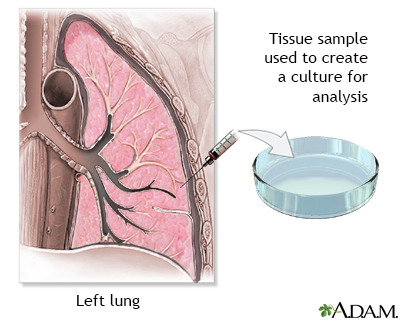Pleural fluid culture
Culture - pleural fluid
Pleural fluid culture is a test that examines a sample of fluid that has been collected in the pleural space to see if you have an infection to help understand the cause of the buildup of fluid in this space. The pleural space is the area between the lining of the outside of the lungs (pleura) and the wall of the chest. When fluid collects in the pleural space, the condition is called pleural effusion.
Images

I Would Like to Learn About:
How the Test is Performed
A procedure called thoracentesis is performed to get a sample of pleural fluid. The sample is sent to a laboratory and examined under a microscope for signs of infection. The sample is also placed in a special dish (culture) to support the growth of microorganisms. It is then watched to see if bacteria or any other germs grow. This can take several days.
How to Prepare for the Test
No special preparation is needed before the test. A chest x-ray will be performed before and after the thoracentesis procedure.
Do not cough, breathe deeply, or move during the procedure to avoid injuring the lung.
How the Test will Feel
For thoracentesis, you sit on the edge of a chair or bed with your head and arms resting on a table. Your health care provider cleans the skin around the insertion site. Numbing medicine (anesthetic) is injected into the skin.
A needle is placed through the skin and muscles of the chest wall into the pleural space. As fluid drains into a collection bottle, you may cough a bit. This is because your lung re-expands to fill the space where fluid had been. This sensation lasts for a few hours after the test.
During the test, tell your provider if you have sharp chest pain or shortness of breath.
Why the Test is Performed
Your provider may order this test if you have signs of a certain infection or if a chest x-ray or CT scan of the chest shows you have too much fluid in the space around the lungs.
Normal Results
A normal result means no bacteria or fungi were seen in the test sample.
A normal value is no growth of any bacteria. Talk to your provider about the meaning of your specific test results.
What Abnormal Results Mean
Abnormal results may indicate:
- Empyema (collection of pus in the pleural space)
- Lung abscess (collection of pus in a lung)
- Pneumonia
- Tuberculosis
Risks
Risks of thoracentesis are:
- Collapsed lung (pneumothorax)
- Excessive loss of blood
- Fluid reaccumulation
- Infection
- Pulmonary edema
- Respiratory distress
- Serious complications are uncommon
Related Information
Community-acquired pneumonia in adultsPulmonary tuberculosis
Pulmonary nocardiosis
References
Blok BK. Thoracentesis. In: Roberts JR, Custalow CB, Thomsen TW, eds. Roberts and Hedges' Clinical Procedures in Emergency Medicine and Acute Care. 7th ed. Philadelphia, PA: Elsevier; 2019:chap 9.
Parta M. Pleural effusion and empyema. In: Bennett JE, Dolin R, Blaser MJ, eds. Mandell, Douglas, and Bennett's Principles and Practice of Infectious Diseases. 9th ed. Philadelphia, PA: Elsevier; 2020:chap 68.
BACK TO TOPReview Date: 12/31/2023
Reviewed By: Jatin M. Vyas, MD, PhD, Associate Professor in Medicine, Harvard Medical School; Associate in Medicine, Division of Infectious Disease, Department of Medicine, Massachusetts General Hospital, Boston, MA. Also reviewed by David C. Dugdale, MD, Medical Director, Brenda Conaway, Editorial Director, and the A.D.A.M. Editorial team.

Health Content Provider
06/01/2025
|
A.D.A.M., Inc. is accredited by URAC, for Health Content Provider (www.urac.org). URAC's accreditation program is an independent audit to verify that A.D.A.M. follows rigorous standards of quality and accountability. A.D.A.M. is among the first to achieve this important distinction for online health information and services. Learn more about A.D.A.M.'s editorial policy, editorial process and privacy policy. A.D.A.M. is also a founding member of Hi-Ethics. This site complied with the HONcode standard for trustworthy health information from 1995 to 2022, after which HON (Health On the Net, a not-for-profit organization that promoted transparent and reliable health information online) was discontinued. |
The information provided herein should not be used during any medical emergency or for the diagnosis or treatment of any medical condition. A licensed medical professional should be consulted for diagnosis and treatment of any and all medical conditions. Links to other sites are provided for information only -- they do not constitute endorsements of those other sites. © 1997- 2025 A.D.A.M., a business unit of Ebix, Inc. Any duplication or distribution of the information contained herein is strictly prohibited.
